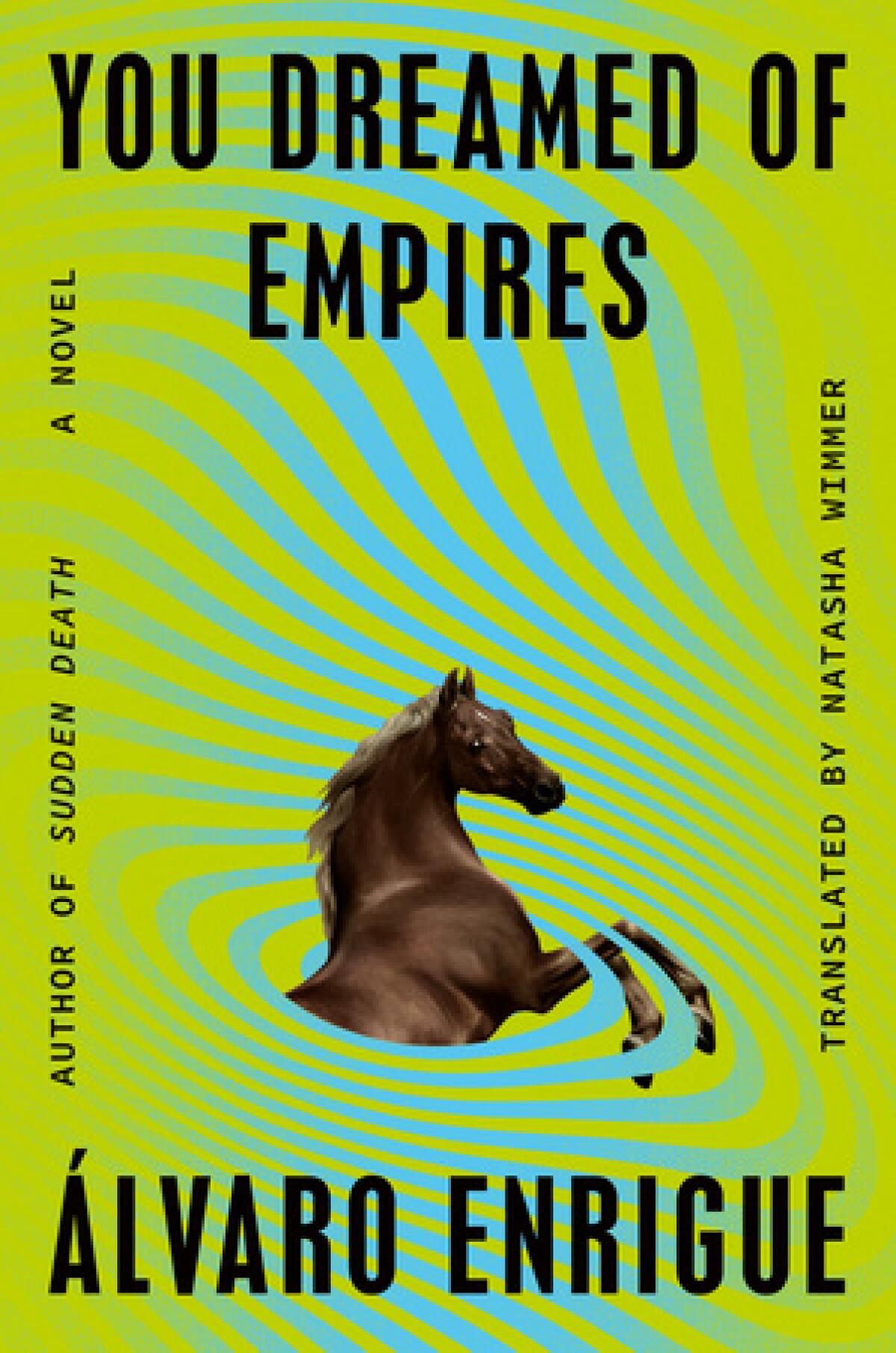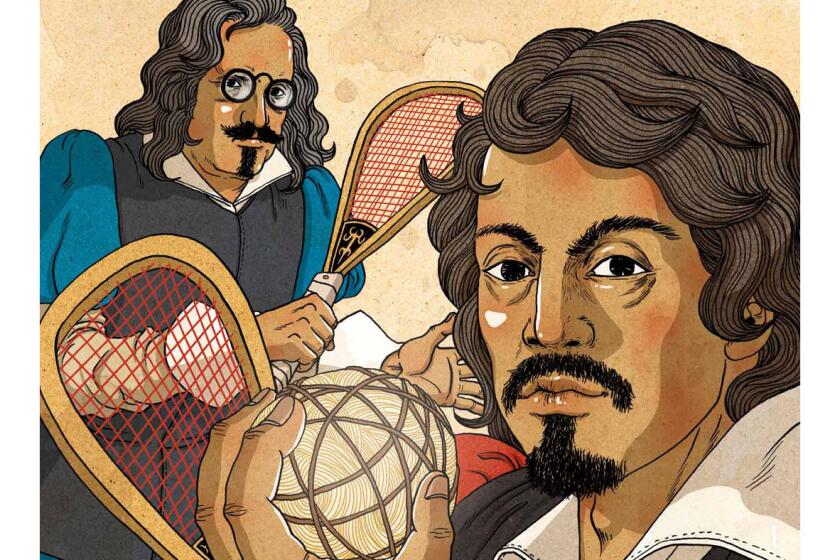How Aztec Mexico was lost in translation: a wild novel revises the Spanish conquest

- Share via
Review
You Dreamed of Empires
By Álvaro Enrigue
Translated by Natasha Wimmer
Riverhead: 240 pages, $28
If you buy books linked on our site, The Times may earn a commission from Bookshop.org, whose fees support independent bookstores.
There was an online ruckus a few months ago when social media users got a taste of Emily Wilson’s translation of “The Iliad,” with some readers bemoaning that it sounded too modern while others believed it revitalized an old tale. Translation is a treacherous endeavor, which sometimes slips into the outrageous: The Icelandic “Dracula” differs starkly from its source material, and a German edition of Terry Prachett’s works once contained an unauthorized insert advertising soup.
Which is to say that I picked up Álvaro Enrigue’s novel about the encounter of Spaniards and Aztecs because I was curious about its title. In Spanish, the book is called “Tu sueño imperios han sido” — a line borrowed from a baroquely beautiful poem that means “your dreams empires have been.” Its English translation is titled “You Dreamed of Empires,” which sounds less Yoda-like and morphs, to my ear, into something different.
I therefore journeyed into “You Dreamed of Empires” already thinking about translation and communication, as well as the limits of both, which turned out to be a prescient frame of mind: The novel dwells on this conundrum.
The Mexican-Canadian author of bestsellers ‘Mexican Gothic’ and ‘Velvet Was the Night’ was born and raised to be a genre-hopping, storytelling dynamo.
The meeting of Hernán Cortés and Emperor Motecuhzoma Xocoyotzin, or Moctezuma — never Montezuma with an “n” — was akin to the meeting of two alien species. The Spaniards, as the victors of this clash of civilizations, would later write narratives crowning themselves as the superior contenders. Enrigue presents us with two societies that feel far removed from our modern sensibilities, one of which — the Aztec empire — has often been shoddily reproduced, its complexity buffed away.

This complexity stands between us and the past. For example, I used the word “Aztec” in a paragraph above for ease of recognition, but as Enrigue’s novel makes clear, there was no such thing as an “Aztec Empire” — a term that was coined centuries after the arrival of the Spanish. Instead, Cortés wandered into a collection of city states, three of them joined in a powerful confederacy, the Triple Alliance. The crown jewel of these three cities, Tenochtitlan, was ruled by the Tenochca and was the realm of Moctezuma.
In Mexico, the past is never really over, and grudges are carried over the centuries. That is how the name Malinche, which referred to Cortés’ interpreter and mistress/slave, has become synonymous with self-hatred, and we still blame the Tlaxcaltecas for destroying Mexico by allying themselves with the Spaniards. Never mind that the axiom “the enemy of my enemy is my friend” has a universal ring to it. The Tlaxcaltecas, the Purépechas and many other groups had little affection for the Triple Alliance, just as Madrid didn’t adore Paris simply because they shared a continent.
Cortés had two interpreters : the aforementioned Malinche — a woman from Olutla, nowadays Veracruz, who had been sold into slavery and could speak Nahuatl and Mayan — and Gerónimo de Aguilar, a shipwrecked Spanish friar who was also enslaved and learned to speak Mayan. Playing what was essentially a game of telephone, the duo interpreted from Spanish to Mayan and from Mayan to Nahuatl, in the process swaying a large group of Indigenous vassals who were tired of paying tribute to Moctezuma and his allies.
A small leather ball stuffed with the hair of a dead queen is batted back and forth by two of Europe’s most innovative artists.
The intricacy of this series of events might have daunted many writers; it’s difficult enough just to portray it accurately and make it comprehensible. Even when someone has done their research — and Enrigue has done it admirably well — the story could easily become ponderous and overblown, a mothballed costume drama. Enrigue’s genius lies in his ability to bring readers close to its tangled knot of priests, mercenaries, warriors and princesses while adding a pinch of biting humor.
The Spaniards who have stumbled onto Moctezuma’s court are aghast at the stench of priests covered in blood from human sacrifices, while Moctezuma’s assiduously clean courtiers complain that the men smell of excrement and dogs. The priests have interminable names, such as He Who Looses the Rain of Words and Governs the Songs Lest We Be Like Flowers and Bees That Last But a Few Days. The emperor spends his days high on mushrooms, coveting the horses of the foreigners like a petulant, overgrown teenager. Cortés doesn’t realize that courtiers call him “El Malinche,” as though he were an extension of his interpreter and not the other way around. After all, it’s her words that they understand, not his. Translator Natasha Wimmer adeptly captures all this whimsy.
At the same time, this comedy is a dark one. Cortés and his men are rough mercenaries who rape, plunder and murder without compunction. They hail from a chaotic and dangerous world, surviving through a mixture of desperation and cruelty. The majestic, orderly city of Tenochtitlan may seem kinder at first glance, but this is also an empire that crushes its opposition. Moctezuma is a capricious ruler who executes courtiers for minute breaches of protocol and who might just lose an entire kingdom for want of a horse. There are no heroes to be had, and women like La Malinche, as well as the emperor’s sister, are among the few who can glimpse the follies of these men with the power to preserve or destroy civilizations.
Zapata, who died this month, wrote 1979’s “The Vampire of Colonia Roma,” a turning point for LGBTQ culture at the height of Mexico’s authoritarian regime.
I’m sure some people will complain of Enrigue’s fictional rendering. Yes, his knowledge of this era is meticulous. Nevertheless, he takes liberties, permits anachronisms, inserts metafictional narratives and seems to have a hell of a good time doing it. On the other hand, it is fiction, and we can’t know the exact words Moctezuma spoke to Cortés. It’s all an exercise of the imagination.
In the end, some meanings are always lost in translation, but if it didn’t happen this way, it should have.
Moreno-Garcia is the author of “Silver Nitrate” and “Mexican Gothic.”
More to Read
Sign up for our Book Club newsletter
Get the latest news, events and more from the Los Angeles Times Book Club, and help us get L.A. reading and talking.
You may occasionally receive promotional content from the Los Angeles Times.












